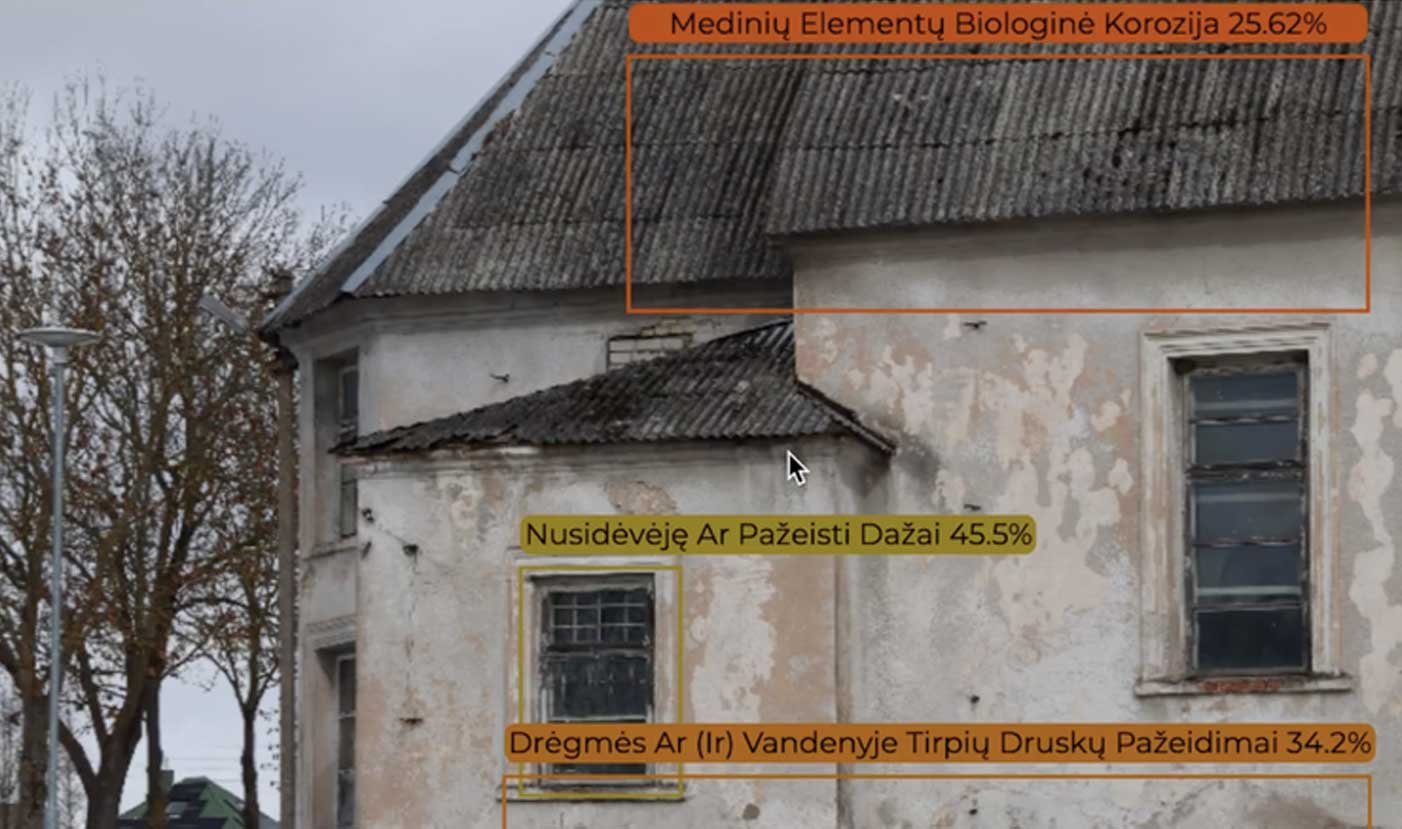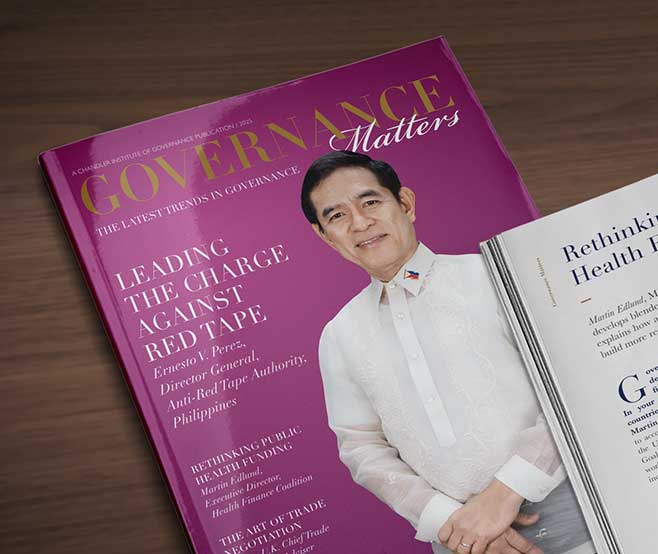Good Governance in a Time of Polycrisis
The latest Chandler Good Government Index offers insights into how governments are responding to – and preparing for – today’s interconnected crises.
Lorem ipsum dolor sit amet, consectetur adipiscing elit, sed do eiusmod tempor incididunt ut labore et dolore magna aliqua. Ut enim ad minim veniam, quis nostrud exercitation ullamco laboris nisi ut aliquip ex ea commodo consequat. Duis aute irure dolor in reprehenderit in voluptate velit esse cillum dolore eu fugiat nulla pariatur.
Heading 1
Heading 2
Heading 3
Heading 4
Heading 5
Heading 6
Lorem ipsum dolor sit amet, consectetur adipiscing elit, sed do eiusmod tempor incididunt ut labore et dolore magna aliqua. Ut enim ad minim veniam, quis nostrud exercitation ullamco laboris nisi ut aliquip ex ea commodo consequat. Duis aute irure dolor in reprehenderit in voluptate velit esse cillum dolore eu fugiat nulla pariatur.
Block quote
Heading 6
Ordered list
- Item 1
- Item 2
- Item 3
Unordered list
- Item A
- Item B
- Item C
Bold text
Emphasis
Superscript
Subscript
A Minister of Public Health in Thailand who is also a pilot helping to deliver donated organs; the CEO of a government organisation in Rwanda and her colleagues collecting data across the country to assess the national state of governance; the UAE’s Chief of Government Services on the power of “listening to the customer’s voice” – these are just a few of the governments thriving and outperforming in a time of crises whose stories were told in the latest Chandler Good Government Index (CGGI) Report.
This is the third year the Chandler Institute of Governance (CIG) has published the CGGI, in a unique format that contextualises its data and rankings through the stories of governments in action that bring those findings to life. The CGGI, which assesses 104 countries using good governance indicators across seven pillars, offers a global, non-partisan, practical view of good governance. It is a subject that, given the mounting pressures facing governments, feels particularly urgent.
Today’s Challenges Are Not New, Their Interconnectedness Is
Though the world has seen pandemics, war, inflation, inequality, and ecological disasters before, today’s challenges are often called “unprecedented”. What is new about today’s crises, however, is their interconnectedness. They collide, cascade, and compound in ways that catastrophes a century ago could not. A single shipping vessel run aground can – and did, in 2021 – impact tens of billions of dollars of global trade; one country’s lockdowns can – and did – affect other nations’ abilities to produce everything from medicines to key technology. As countries are increasingly linked, so too are the risks they face.
Hence the popularity of the term “polycrisis”, which the World Economic Forum (WEF) describes as “a cluster of related global risks with compounding effects, such that the overall impact exceeds the sum of each part”. And, according to the WEF, these risks “are converging to shape a unique, uncertain, and turbulent decade to come”.
This makes the findings of a recent survey from Deloitte particularly worrying. Fewer than one in four government leaders (23%) “completely agreed” that their organisation could quickly pivot and adapt to disruptive events – a lower rate than leaders from other sectors Deloitte polled. In other words, at a time when governments are set to face a “turbulent decade” of crises, those leading governments lack faith in their ability to respond at speed.


Good Governments Are Better Able to Prepare For – and Respond to – Crises
Clearly, governments are not solely responsible for helping countries navigate the polycrisis – NGOs, businesses, international organisations, and citizens all have a role to play. And in a world of interconnected risk, international cooperation matters greatly as well.
While government may not be solely responsible in responding to the polycrisis, it plays a decisive role. A well-governed country, the 2023 CGGI found, is likely to have developed more resilience to prepare for and manage crises. Such a conclusion might not sound surprising, but it is worth remembering that the CGGI measures the capabilities and outcomes of 104 countries or roughly 90% of the world’s population. In other words, the relationship between good governance and crisis response and preparedness is powerful, and holds true regardless of a country’s income level, ideology, or geography.
Among other analyses, we compared countries’ CGGI scores with several separate indices. The first was the Fragile States Index, a political risk assessment tool developed by The Fund for Peace. A powerful link emerged between good governance (which the CGGI measures) and crisis preparedness (which the Fragile States Index measures).
Another was the INFORM Risk Index by the Joint Research Centre of the European Union. Comparing countries’ scores on that index with their overall CGGI scores saw another strong relationship emerge, this time between the quality of a country’s governance and its ability to respond to humanitarian crises and disasters.


Revealing the Path to Better Governance and Shared Prosperity
The CGGI also reveals a strong link between effective governance and the reduction of extreme inequality. This implies that well-governed nations are more likely to achieve shared prosperity and foster fairer, more inclusive societies.
This connection holds great significance. The COVID-19 pandemic showed that crises can have a disproportionate impact on vulnerable groups. They not only highlight existing social and economic disparities but also have the potential to widen them, leading to possible
social instability.
The CGGI rankings demonstrate a robust correlation with those of the Commitment to Reducing Inequality (CRI) Index. The CRI Index evaluates the efforts of 161 governments worldwide in three critical areas for reducing inequality: social spending, progressive taxation,
and labour rights.
Another key finding of the CGGI is that good government is built on core capabilities. This year’s findings showed an encouraging picture: good government can make a measurable difference in a time of polycrisis, and the path to better government is available to any country willing to invest the time and resources in developing the necessary skills. In particular, the CGGI’s analysis found that three capabilities are most closely correlated with good governance: rule of law, property rights, and anti-corruption. This was also true for the 2021 and 2022 editions of the CGGI, illustrating how fundamental these three components of government are to delivering effective governance.


Learning Through Stories
“Telling stories is one of the most powerful means that leaders have to influence, teach, and inspire,” wrote Vanessa Boris of Harvard Business Publishing in a 2017 article. “Storytelling forges connections among people, and between people and ideas. Stories convey the culture, history, and values that unite people.” They are in fact 22 times more memorable, according to research by Stanford professor Jennifer Aaker. Aaker and Boris’s insights highlight why the CGGI Report chooses to focus on sharing stories alongside its data and rankings rather than offering prescriptions.
The CGGI’s analysis found that three capabilities are most closely correlated with good governance: rule of law, property rights, and anti-corruption.
Rwanda’s Focus on Measuring What Matters
Take a story from Rwanda, for instance. In the 2023 CGGI, Rwanda was once again the highest-scoring low-income country, ranking 52nd overall. It is a remarkable achievement for a country that was, a little under three decades ago, being called a “human tragedy” and a “humanitarian crisis” by world leaders. CIG spoke with Dr Usta Kaitesi, CEO of the Rwanda Governance Board, a public institution that monitors the government and shares its findings directly with senior leaders. Among the many lessons Dr Kaitesi shared was the importance of culture: “There is an intentional leadership approach that instils a culture of holding ourselves accountable,” she said.
Achieving Better Health Outcomes in Thailand
Another impressive story came from Thailand, which moved up 22 places in the 2023 CGGI to rank 33rd globally in the “Health” indicator. The country’s response to COVID-19 was of such a calibre that it drew praise from the World Health Organisation. CIG spoke with Anutin Charnvirakul, Thailand’s Deputy Prime Minister and Minister of Public Health, in a wide-ranging conversation that touched on everything from the importance of regional cooperation to the belief that guided Charnvirakul and his colleagues: “No one is safe until everyone is safe.”

The UAE Cracks the Top 20
There is also the UAE, which ranked 20th overall in this year’s CGGI. The nation ranked 2nd in the “Leadership and Foresight” pillar, and moved up 13 places to rank 21st in the “Strong Institutions” pillar. As the country embarks on the UAE Centennial 2071, its 50-year national plan, CIG spoke with H.E. Mohamed Bin Taliah, Chief of Government Services, about his country’s focus on service excellence. The conversation highlighted the many tools that the UAE has developed and invested in to better connect with its people, including a “UAE Mystery Shopper” app that allows citizens to review government services.

Stories of Resilience and Resolve
The list goes on. Vietnam, North Macedonia, Kenya, Morocco, and Indonesia – these are just some of the countries that climbed between three to six ranks in this year’s CGGI, and whose progress we analysed in the report.
Between Governance Matters and this year’s CGGI Report, CIG has shared stories and interviews from six continents and more than 43 countries this year. These stories invite us to consider new ideas, ask new questions, and explore new solutions. Above all, they remind us that, even in a time of polycrisis, progress is possible.

Top 20 Countries of the CGGI 2023

Stories of Good Governance Defying the Polycrisis
A pandemic, war, inflation, the rising cost of living, and food insecurity – these interconnected challenges, together creating what has come to be known as the “polycrisis”, have created unprecedented difficulties for governments around the world. The 2023 Chandler Good Government Index unveiled many stories of how good governments have been able to successfully deliver strong national outcomes even during times of relentless change and uncertainty.






Heading 1
Heading 2
Heading 3
Heading 4
Heading 5
Heading 6
Lorem ipsum dolor sit amet, consectetur adipiscing elit, sed do eiusmod tempor incididunt ut labore et dolore magna aliqua. Ut enim ad minim veniam, quis nostrud exercitation ullamco laboris nisi ut aliquip ex ea commodo consequat. Duis aute irure dolor in reprehenderit in voluptate velit esse cillum dolore eu fugiat nulla pariatur.

Block quote
Ordered list
- Item 1
- Item 2
- Item 3
Unordered list
- Item A
- Item B
- Item C
Bold text
Emphasis
Superscript
Subscript
Lorem ipsum dolor sit amet, consectetur adipiscing elit, sed do eiusmod tempor incididunt ut labore et dolore magna aliqua. Ut enim ad minim veniam, quis nostrud exercitation ullamco laboris nisi ut aliquip ex ea commodo consequat. Duis aute irure dolor in reprehenderit in voluptate velit esse cillum dolore eu fugiat nulla pariatur.
Endnotes
- Item 1
- Item 2
- Item 3

Reporting and analysis by Wu Wei Neng, Dominic Tan Gabriel-Dean, Victoria Giaever-Enger, Christopher Wong, and Wen Haoyu, who work at the Chandler Institute of Governance and are part of the team that produces the annual Chandler Good Government Index. A version of this article originally appeared in the 2023 Chandler Good Government Index Report.
Lorem ipsum dolor sit amet, consectetur adipiscing elit, sed do eiusmod tempor incididunt ut labore et dolore magna aliqua. Ut enim ad minim veniam, quis nostrud exercitation ullamco laboris nisi ut aliquip ex ea commodo consequat. Duis aute irure dolor in reprehenderit in voluptate velit esse cillum dolore eu fugiat nulla pariatur.













